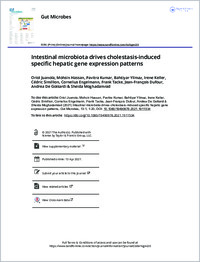Intestinal microbiota drives cholestasis-induced specific hepatic gene expression patterns
- Juanola, Oriol Translational Research Laboratory, Gastroenterology and Hepatology, Ente Ospedaliero Cantonale, Bellinzona, Switzerland - Università della Svizzera italiana, Lugano, Switzerland
- Hassan, Mohsin Department of Hepatology & Gastroenterology, Charité Universitätsmedizin Berlin, Berlin, Germany
- Kumar, Pavitra Hepatology, Department for Biomedical Research, University of Bern, Bern, Switzerland
- Yilmaz, Bahtiyar Gastroenterology, Department for Biomedical Research, University of Bern, Bern, Switzerland - University Clinic of Visceral Surgery and Medicine, Inselspital, Bern, Switzerland
- Keller, Irene Department for Biomedical Research and Swiss Institute of Bioinformatics, University of Bern, Bern, Switzerland
- Simillion, Cédric Department for Biomedical Research and Swiss Institute of Bioinformatics, University of Bern, Bern, Switzerland
- Engelmann, Cornelius Department of Hepatology & Gastroenterology, Charité Universitätsmedizin Berlin, Berlin, Germany - Institute for Liver and Digestive Health, University College London, London, UK - Berlin Institute of Health (BIH), Berlin, Germany
- Tacke, Frank Department of Hepatology & Gastroenterology, Charité Universitätsmedizin Berlin, Berlin, Germany
- Dufour, Jean-François Hepatology, Department for Biomedical Research, University of Bern, Bern, Switzerland - University Clinic of Visceral Surgery and Medicine, Inselspital, Bern, Switzerland
- De Gottardi, Andrea Translational Research Laboratory, Gastroenterology and Hepatology, Ente Ospedaliero Cantonale, Bellinzona, Switzerland - Università della Svizzera italiana, Lugano, Switzerland - Hepatology, Department for Biomedical Research, University of Bern, Bern, Switzerland - University Clinic of Visceral Surgery and Medicine, Inselspital, Bern, Switzerland
- Moghadamrad, Sheida Gastroenterology, Department for Biomedical Research, University of Bern, Bern, Switzerland - Translational Research Laboratory, Gastroenterology and Hepatology, Ente Ospedaliero Cantonale, Bellinzona, Switzerland - Università della Svizzera italiana, Lugano, Switzerland - Hepatology, Department for Biomedical Research, University of Bern, Bern, Switzerland - University Clinic of Visceral Surgery and Medicine, Inselspital, Bern, Switzerland
-
2021
Published in:
- Gut microbes. - Taylor & Francis. - 2021, vol. 13, no. 1, p. 20
English
Intestinal microbiota regulates multiple host metabolic and immunological processes. Consequently, any difference in its qualitative and quantitative composition is susceptible to exert significant effects, in particular along the gut-liver axis. Indeed, recent findings suggest that such changes modulate the severity and the evolution of a wide spectrum of hepatobiliary disorders. However, the mechanisms linking intestinal microbiota and the pathogenesis of liver disease remain largely unknown. In this work, we investigated how a distinct composition of the intestinal microbiota, in comparison with germ-free conditions, may lead to different outcomes in an experimental model of acute cholestasis. Acute cholestasis was induced in germ-free (GF) and altered Schaedler’s flora (ASF) colonized mice by common bile duct ligation (BDL). Studies were performed 5 days after BDL and hepatic histology, gene expression, inflammation, lipids metabolism, and mitochondrial functioning were evaluated in normal and cholestatic mice. Differences in plasma concentration of bile acids (BA) were evaluated by UHPLC-HRMS. The absence of intestinal microbiota was associated with significant aggravation of hepatic bile infarcts after BDL. At baseline, we found the absence of gut microbiota induced altered expression of genes involved in the metabolism of fatty and amino acids. In contrast, acute cholestasis induced altered expression of genes associated with extracellular matrix, cell cycle, autophagy, activation of MAPK, inflammation, metabolism of lipids, and mitochondrial functioning pathways. Ductular reactions, cell proliferation, deposition of collagen 1 and autophagy were increased in the presence of microbiota after BDL whereas GF mice were more susceptible to hepatic inflammation as evidenced by increased gene expression levels of osteopontin, interleukin (IL)-1β and activation of the ERK/MAPK pathway as compared to ASF colonized mice. Additonally, we found that the presence of microbiota provided partial protection to the mitochondrial functioning and impairment in the fatty acid metabolism after BDL. The concentration of the majority of BA markedly increased after BDL in both groups without remarkable differences according to the hygiene status of the mice. In conclusion, acute cholestasis induced more severe liver injury in GF mice compared to mice with limited intestinal bacterial colonization. This protective effect was associated with different hepatic gene expression profiles mostly related to tissue repair, metabolic and immune functions. Our findings suggest that microbial-induced differences may impact the course of cholestasis and modulate liver injury, offering a background for novel therapies based on the modulation of the intestinal microbiota.
- Language
-
- English
- Classification
- Medicine
- License
- Open access status
- gold
- Identifiers
-
- RERO DOC 333675
- DOI 10.1080/19490976.2021.1911534
- ARK ark:/12658/srd1319307
- Persistent URL
- https://n2t.net/ark:/12658/srd1319307
Statistics
Document views: 204
File downloads:
- Texte intégral: 363
